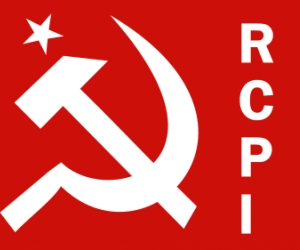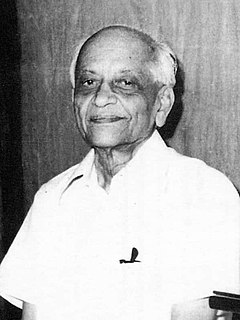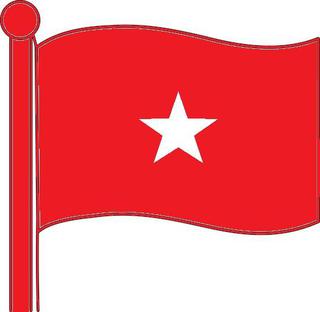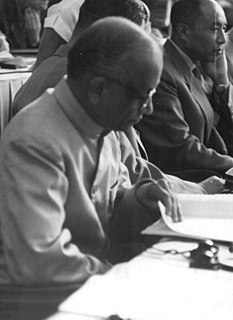Further reading
- Leftist Politics in India; M. N. Roy and the Radical Democratic Party by Dipti Kumar Roy, 1989 Minerva, ISBN 81-85195-18-8
- Report: last battles of freedom, Radical Democratic Party, 1945 Calcutta
Radical Democratic Party (RDP), was a political party in India which existed at the time of the Second World War. Also known as the Radical Communist Party. RDP evolved out of the League of Radical Congressmen, which had been founded in 1939 by former Communist International leader M.N. Roy. Roy founded Radical Democratic Party in 1940 with the purpose of engaging India in the war to support the Allies. RDP also worked for Indian independence. RDP was against the industrial strike that took place at the time.
During the period 1944–1948 the general secretary of RDP was V. M. Tarkunde.
The trade union wing of the Royists was the Indian Federation of Labour.
RDP was dissolved in 1948, to give place to the Radical Humanist movement.

Elamkulam Manakkal Sankaran Namboodiripad, popularly known as EMS, was an Indian communist politician and theorist, who served as the first Chief Minister of Kerala in 1957–1959 and then again in 1967–1969. As a member of the Communist Party of India (CPI), he became the first non-Congress Chief Minister in the Indian republic. In 1964, he led a faction of the CPI that broke away to form the Communist Party of India (Marxist). He completed his graduation from St. Thomas College, Thrissur Kerala.

The Communist Party of India (Marxist) is a communist political party in India. It is the largest communist party of India in terms of membership and electoral seats and one of the national parties of India. The party emerged from a split in the Communist Party of India (CPI) on 7 November 1964. As of 2022, CPI(M) is a part of ruling alliances in two states — the Left Democratic Front in Kerala and the Secular Progressive Alliance in Tamil Nadu. CPIM has representation in the legislative assemblies of 9 states.

The Communist Party of India (CPI) is the oldest communist party in India and one of the eight national parties in the country. The CPI was founded in Kanpur on 26 December 1925.

Revolutionary Socialist Party (RSP) is a communist party in India. The party was founded on 19 March 1940 by Tridib Chaudhuri and has its roots in the Bengali liberation movement Anushilan Samiti and the Hindustan Socialist Republican Army.

The Revolutionary Communist Party of India is a political party in India. The party was founded as the Communist League by Saumyendranath Tagore in 1934, breaking away from the Communist Party of India (CPI). RCPI led armed uprisings after the independence of India, but later shifted to parliamentary politics. The party is active in the Kerala, West Bengal and Assam. The party was represented in the West Bengal while being a part of Second United Front Cabinet (1969) as well as in various state government during the Left Front rule in the state (1977–2011). In Assam, the party won four Legislative Assembly seats in 1978, but its political influence has since declined in the state.

Manabendra Nath Roy was an Indian marxist revolutionary, radical activist and political theorist, as well as a noted philosopher in the 20th century. Roy was the founder of the Mexican Communist Party and the Communist Party of India. He was also a delegate to congresses of the Communist International and Russia's aide to China. In the aftermath of World War II Roy moved away from orthodox Marxism to espouse the philosophy of radical humanism, attempting to chart a third course between liberalism and communism.
Workers Party of India is a political party in the Indian state of West Bengal. WPI has its origin in the Democratic Vanguard in India. DV was formed in 1943 when a group led by Jiban Lal Chattopadhyay broke away from the Radical Democratic Party of Manabendra Nath Roy. DV were dissatisfied with the development of RDP into a non-Marxist outfit. Jiban Lal Chattopadhyay had been elected secretary of the Bengal Congress in 1930.
Vithal Mahadeo Tarkunde, was a prominent Indian lawyer, civil rights activist, and humanist leader and has been referred to as the "Father of the Civil Liberties movement" in India and a former judge of the Bombay High Court The Supreme Court of India also praised him as "undoubtedly the most distinguished judge of the post-Chagla 1957 period" in the Bombay High Court.

Virendranath Chattopadhyaya, alias Chatto,, also known by his pseudonym Chatto, was a prominent Indian revolutionary who worked to overthrow the British Raj in India using armed force. He created alliances with the Germans during World War I, was part of the Berlin Committee organising Indian students in Europe against the British, and explored actions by the Japanese at the time.

Malayapuram Singaravelu, also known as M. Singaravelu and Singaravelar, was a pioneer in more than one field in India. In 1918, he founded the first trade union in India. On 1 May 1923 he organised the first ever celebration of May Day in the country. Singaravelar was a major leader of the Indian independence movement, initially under the leadership of Gandhi, but later, joining the budding communist movement. In 1925, he became one of the founding fathers of the Communist Party of India; and chaired its inaugural convention in Kanpur. Though the British Government arrested him along with other leaders on charges of conspiring to wage war against the Crown, he was set free, soon after, on account of his failing health. Singaravelar was also a path-breaking social reformer who in his early life took to Buddhism, seeing it as a weapon against the evil of untouchability, which was particularly severe in the 19th-century India. He was also in the forefront of Self respect movement, in the Madras Presidency that fought for equal rights for backward castes. Though in his advanced years, he withdrew from active politics, Singaravelar remained a staunch advocate of the causes he had pioneered till his death at the age of 85.

Shripad Amrut Dange was an Indian Politician who was a founding member of the Communist Party of India (CPI) and a stalwart of Indian trade union movement. During the 20th century, Dange was arrested by the authorities for communist and trade union activities and was jailed for an overall period of 13 years.
Shaukat Usmani (1901–1978) was an early Indian communist, who was born to artistic USTA family of Bikaner and a member of the émigré Communist Party of India, established in Tashkent in 1920, and a founding member of the Communist Party of India (CPI) formed in Kanpur in 1925. He was also the only candidate to the British Parliament contesting elections, while he was residing in India—that too in a prison. He was sentenced to a total of 16 years in jail after being tried in the Kanpur (Cawnpore) Case of 1923 and later the Meerut Conspiracy Case of 1929.
Socialism in India is a political movement founded early in the 20th century, as a part of the broader movement to gain Indian independence from colonial rule. The movement grew quickly in popularity as it espoused the causes of India's farmers and labourers against the zamindars, princely class and landed gentry. Socialism shaped the principal economic and social policies of the Indian government but mostly followed Dirigisme after independence until the early 1990s, when India moved towards a more market-based economy. However, it remains a potent influence on Indian politics, with many national and regional political parties espousing democratic socialism.
The Workers and Peasants Party (WPP) was a political party in India, which worked inside the Indian National Congress in 1925–1929. It became an important front organisation for the Communist Party of India and an influential force in the Bombay labour movement. The party was able to muster some success in making alliances with other left elements inside the Congress Party, amongst them Jawaharlal Nehru. However, as the Communist International entered its 'Third Period' phase, the communists deserted the WPP project. The WPP was wound up, as its leadership was arrested by the British authorities in March 1929.

Sibnarayan Ray (1921–2008) was an Indian thinker, educationist, philosopher and literary critic who wrote in the Bengali language. A radical humanist, he is widely reputed for his works on Marxist-revolutionary Manabendra Nath Roy, and famous polymath Bertrand Russell, commenting on Ray, once said that "... Sibnarayan Ray stands for a point of view which I consider important in every part of the world. ... His writings ably represents a more reasonable point of view than that of most writers of our time."
Communism in India (1925-1964) has existed as a social or political ideology as well as movement since at least as early as the 1920s. In its early years, the communist ideology was harshly suppressed through legal prohibitions and criminal prosecutions. Eventually, the communist parties became ensconced in national party politics, sprouting several political offshoots.

The Bolshevik Party of India is an Indian political party in India. The party was founded in 1939. The party had a certain role in the trade union movement in West Bengal and was briefly represented in the state government in 1969. In later years the party has played a negligible role in Indian politics.

Communism in Kerala refers to the strong presence of communist ideas in the Indian state of Kerala. In addition to Kerala, the Indian states of West Bengal and Tripura have had multiple democratically elected Marxist governments, and change takes place in the government by regular multiparty electoral processes. Communism of Kerala has provided Indian communist stalwarts such as M. N. Govindan Nair, C. Achutha Menon, K. Damodaran, T. V. Thomas, N. E. Balaram, E. M. S. Namboodiripad, A. K. Gopalan, K. R. Gouri Amma, P. K. Vasudevan Nair and C. K. Chandrappan
The 2nd Congress of the Communist Party of India was held in Calcutta, West Bengal from 28 February to 6 March 1948. At the Second Party Congress, the party line shifted dramatically under the new General Secretary B.T. Ranadive and subsequently the party engaged in revolutionary insurrections across the country.

In 1964 a major split occurred in the Communist Party of India. The split was the culmination of decades of tensions and factional infighting. When India became independent in 1947, differences arose of how to adapt to the new situation. As relations between the Nehru government and the Soviet Union improved, a faction that sought cooperation with the dominant Indian National Congress emerged within CPI. This tendency was led by S.A. Dange, whose role in the party hierarchy became increasingly controversial. When the Sino-Indian War broke out in 1962 Dange's opponents within CPI were jailed, but when they were released they sought to challenge his leadership. In 1964 the party was finally divided into two, with the left faction forming the Communist Party of India (Marxist). The split had a lot of regional variations. It also impacted other organizations, such as trade union and peasant movements. The split has been studied extensively by scholars, who have sought to analyze the various domestic and international factors involved.